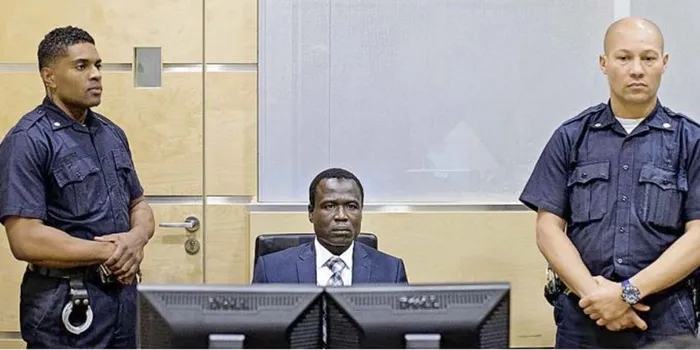Why ICC jail term for Ongwen matters for Africa

Picture: EPA – A commander in the feared Uganda-based Lord’s Resistance Army (LRA) rebel militia, Dominic Ongwen, centre, first appeared at the International Criminal Court (ICC) in The Hague, The Netherlands, in 2015.
By Tonny Kirabira and Dennis Jjuuko
The International Criminal Court (ICC) has upheld its 25-year jail sentence against former Ugandan rebel commander Dominic Ongwen. In a decision delivered on December 15, 2022, the ICC Appeals Chamber confirmed, by majority, the punishment imposed in May 2021.
Ongwen was the first Lord’s Resistance Army leader to be found guilty of the crimes during which thousands were killed or displaced in Northern Uganda. His commander and Lord’s Resistance Army founder, Joseph Kony, is still at large. The US is offering up to $5 million for information leading to his capture. One of Kony’s tactics during the two decades of insurgency was the abduction and conscription of children into his army. Ongwen was about 9 years old when he was abducted.
Many former child soldiers surrendered to the Ugandan forces under an amnesty framework and were later resettled into their communities. In 2005, the ICC Pre-Trial Chamber issued warrants of arrest for Kony, Ongwen and three other senior leaders of the Lord’s Resistance Army for war crimes and crimes against humanity committed in Northern Uganda.
On May 6, 2021, the ICC sentenced him to 25 years’ imprisonment after finding him guilty of 61 counts of war crimes and crimes against humanity. He appealed against the jail term. So why is the verdict on Ongwen’s appeal important to the African continent? There are four key reasons.
The decision of the ICC Appeals Chamber:
* Sets precedence on forced marriages and forced pregnancies.
* Advances international jurisprudence.
* Tackles the question of child soldiers.
* Underscores the role of ICC member states. The ICC Trial Chamber convicted
Ongwen of sexual and gender-based violence crimes against seven women he held in custody. Unlike the crimes of enslavement, rape and sexual slavery, the crime of forced marriage is not explicitly set out in the Rome Statute. Recognising and interpreting forced marriage as a separate crime against humanity was a critical step in achieving justice for the victims of sexual and gender-based violence at the Hague-based court.
The Trial Chamber indicated that the crime of forced marriage depends on the unlawful confinement of a (forcibly made) pregnant woman, with the effect that the woman is deprived of reproductive autonomy. This interpretation implies that judges will henceforth be mindful of the vulnerability of women during armed conflicts.
Ongwen’s was also the first case where the ICC dealt with the crime of forced pregnancy. Equally important to note is the Trial Chamber’s emphasis of its expansive interpretation of the Rome Statute. It noted: “As with any crime, forced pregnancy must be interpreted in a manner that gives this crime independent meaning from the other sexual and gender-based violence crimes in the statute.”
The Appeals Chamber stresses the need to protect women’s reproductive health, including the right to family planning. The implication is that prosecution of sexual and gender-based violence within armed conflict and post-war contexts will most likely increase.
The pattern of violating women’s bodies cannot be overlooked, even beyond the context of armed conflict. The explicit recognition of Ongwen victims’ experiences of harm within the context of sexual and gender-based violence can address socio-cultural injustices against women in transitional contexts.
The ICC judgments in the Ongwen case are highly relevant for feminist legal scholars and proponents of gender-sensitive judging, viewed as an important precedent on reproductive autonomy and rights. The ICC therefore sets a good precedent for analysing the precarious situation of victims of sexual and gender-based violence.
This will be helpful in conflicts like the Central African Republic, Democratic Republic of Congo, Ethiopia and South Sudan. The ICC decision on Ongwen provides an important precedent regarding child soldiers. It allows courts in other African contexts to differentiate between children as victims (child soldiers) and as perpetrators of crimes.
The conscription of children into combat is still a challenge in contexts like the DRC. As a result of this ICC precedent, African courts can no longer absolve former child soldiers from criminal liability for crimes committed after they rose to high command positions. Support by member states is crucial.
The investigation, surrender and successful prosecution of Ongwen cost significant amounts of finances. It required support from the state and other actors. It shows the dependence of the ICC on member states’ co-operation to fulfil its mandate.
The Ugandan government, for instance, referred the Lord’s Resistance Army crimes to the ICC. It also actively engaged in investigations and providing evidence. Going forward, proponents of international justice in Africa will need to engage with ICC member states. They should also seek technical and financial support from donors and private stakeholders.
Victims, experts and academics made key contributions to this significant jurisprudence on sexual and gender-based violence in the Ongwen case. For other African countries dealing with legacies of international crimes and war crimes, availability of adequate finances and technical expertise will be crucial.
Kirabira is a teaching fellow, University of Portsmouth and Jjuuko is a doctoral candidate, UMass Boston.
This article was published first in The Conversation